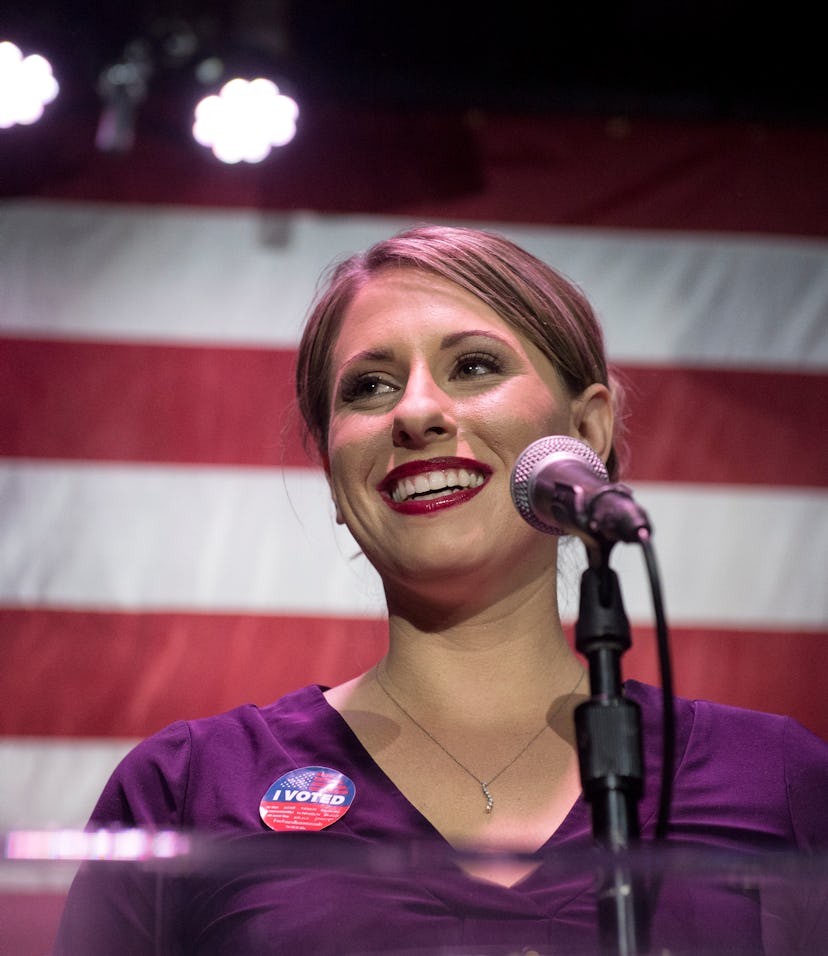Rule Breakers
Katie Hill: "We Need To Vote For Women Because They’re Women"
Instead of running for reelection this fall, she’s helping other women join the ranks.

Less than a year ago, Katie Hill, a bright millennial star in Congress, spent her days shuttling back and forth between Capitol Hill and California’s 25th District, championing progressive ideals like accessible health care and affordable housing for her constituents. Then the photos leaked. The rest of the story you likely have already heard — a very public crucifixion followed by a very public resignation in which she promised that though she had to take her fight “outside the halls of Congress,” she wouldn’t be going away.
And she was right.
Hill, 32, remains a fixture in the political dialogue, possibly more so than when she was a congresswoman. She's devoting her platform and influence to challenging how power and gender intersect. And she’s doing that not only by telling her story on her own terms with a new book, She Will Rise: Becoming a Warrior in the Battle for True Equality, but with a recently launched PAC, HER Time, that aims to push overlooked, underfunded women candidates to the fore, such as Dr. Hiral Tipirneni, a former emergency room physician who's running for Arizona's 6th Congressional District. Both projects feel like an opening salvo from a generation of women in politics who won’t be told “wait” any longer. Here, Hill talks to Bustle about her interactions with sexism and misogyny and how they've informed her current work.
Growing up in Southern California, what did girlhood signify to you?
I was always a tomboy growing up. I would play with the boys to show that anything they could do, I could do better. I defied the stereotypes. It's funny that the colors I use now [in my book jacket and for HER Time] are largely purple and pink because I pointedly hated those colors when I was a kid.
Can you talk a bit about that change? There's a page in your book where you detail your process of getting ready for work and how long you'd spend in front of a mirror.
The older I got, the harder it was to defy gender norms. The pressure to look good, to wear makeup, and to shave your legs was more pronounced. Once I went into politics, it became clear that your physical appearance really affects how you're perceived, and the way that people respond to you.
It was a trial-and-error thing. I figured out what look was best for certain situations. You're going to constantly face that criticism, no matter how accomplished you are.
You write about the battles women confront in their personal, professional, and social lives. What are the biggest challenges facing women who want to run for office?
The biggest internal challenge — and we know this from research — is that women do not feel like they’re ready. It's the same thing in job applications. If they see one thing in a job description that they don't meet that criteria for, they often won't apply. Whereas a guy will meet maybe half of [the criteria], and he'll be like, "Yeah, I'm totally qualified." We see that same thing with politics. That internalized lack of confidence is a big barrier keeping women from running in the first place.
Once you decide to run, you bump up against disparagement from other people. Sometimes it will be, "Oh, she's too young," or it comes out [as scrutiny] about the way you speak, or whether you're wearing enough makeup or too much makeup. You're constantly facing that kind of criticism. Guys don't get clothing advice from total strangers on a daily basis as they're running for office. But one of the most difficult things is how that manifests in terms of raising money.
A nice segue to your new political action committee, HER Time. What do you hope it will achieve?
I decided to start HER Time to help [women candidates] get that initial start, whether it's through candidate mentoring or through direct financial support. [That could mean] helping to raise money through my funding networks, and making sure that women have an additional boost to overcome those barriers that exist from the very beginning.
Is it meant to act as an incubator or more of a talent search?
It's a little bit of both. We're looking for people up and down the ballot who have a great deal of potential [but] who might not have been picked up by other big groups because their races are tougher.
How can we combat stereotypes during this election cycle?
Every day we run up against stereotypes, ways of defining women. This manifests particularly in politics, where leadership characteristics that are considered positives in men are often perceived as annoying or b*tchy in women. We've seen that come to light with this vice-presidential conversation, about [Sen.] Kamala Harris. "She didn't say she was sorry," and "she's too ambitious." It's seen as something to be suspicious of.
As voters, we need to look at those internalized views. We often say, “I want to support a woman, but not this woman,” or “Women should be elected to office, but I really liked this guy. Maybe next time.” It's going to take a really intentional effort to elect more women. We've seen that masculine leadership [can be] problematic, especially in troubled times like this. A mantra that comes out of the book is that we need to vote for women because they're women. Women have great potential to lead in a different way.
This interview has been edited and condensed for clarity.